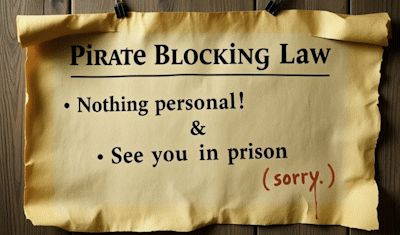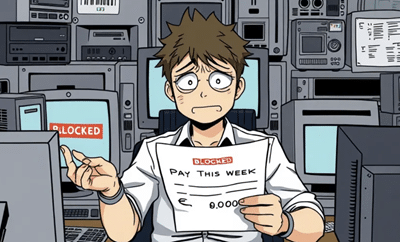Italian ISPs are required to work with AGCOM and rightsholders to ensure the Piracy Shield blocking system operates as intended. It's a burden that only benefits rightsholders, but the ISPs are expected to cover their own costs. That contribution was insulted this week by a legal amendment that threatens ISPs with prison for failing to report piracy to the authorities. Google describes it as a requirement to flood the judiciary to avoid prison. ISPs speak of betrayal; it doesn't get any worse than that.

Fresh amendments to Italian law were passed by Senators this week and their effects will soon be felt on the IPTV piracy battlefield.
Covered in detail in our earlier report, this advanced legal weaponry is incapable of dealing with distant pirate IPTV services. Instead, it mainly targets communications infrastructure, much of it operated by rightsholders’ supposed allies – ISPs – who were given no say in the matter.
Clever Amendments, Guilt-Free Friendly Fire, and a Year Off Work
VPN and DNS services anywhere on planet earth will be required to join Piracy Shield and start blocking pirate sites, most likely at their own expense, just like Italian ISPs are required to do already. And remember the uproar when Cloudflare was wrongfully blocked in a case of shared IP address collateral damage? Well, a preventative fix arrived this week thanks to a clever amendment.
Moving forward, if pirate sites share an IP address with entirely innocent sites, and the innocent sites are outnumbered, ISPs, VPNs and DNS services will be legally required to block them all.

Since nobody ever passes bad law and good laws hurt no one, blocking innocent sites can be conducted guilt-free from the moral high ground.
And since the law applies worldwide, regardless of where a VPN or DNS is located or operated from, the moral high ground can be enjoyed in China or even North Korea.
Limitless Blocking, Unlimited Liability
Limits on the volume of domains and IP addresses previously agreed with ISPs, to prevent their systems collapsing and taking the rest of the Italian internet down as well, are suddenly no longer required. At least according to those who came up with a legal amendment that strongly suggests that.
Admittedly, there is the small matter of the agreement on limits previously reached with ISPs, to prevent their platforms from collapsing under the strain, but ask yourself this: What use is an ISP to its owners when they’re in prison for failing to immediately report all known infringements on their platform to the authorities? Exactly.
That’s just one example of the genius behind the amendment that provides ISPs with up to a whole year of involuntary confinement, hard bunks, and a much deserved break from family and friends. It also offers up to a year off work and much longer if there’s no business left to come back to afterward. Indeed, that’s yet another example of how the amendment thwarts pirates.
Despite Obvious Benefits, ISPs Absolutely Hate The Amendments
Giovanni Zorzoni, President of the Italian Internet Provider Association (AIIP), slammed the amendments this week and identified the forces behind them.
“Irresponsible initiative that, in the sole interest of the football lobby, tramples on operators, [AGCOM] and the Internet ecosystem,” he said.
“Thanks to the new law, they will be able to block sites that are no longer exclusively, but also ‘mainly’ used to distribute illegal content, substantially widening the scope of [rightsholders’] discretion. It may therefore happen, much more frequently, that even legitimate addresses that are only accidentally used for the transmission of pirated content are blocked,” Zorzoni added.
“This is also a serious matter for [AGCOM], which will find itself having to manage a possibly infinite mass of appeals compared to just as many reports that will correspond to false positives.”
Zorzoni views the prospect of going to prison in Italy, for failure to promptly report illegal conduct by users to the judicial authorities or the police, as more of a negative than anything else. Interestingly, complying with Italian law could mean violating laws elsewhere too, raising the prospect of being punished in two places at once, for engaging in an activity that is not required under EU law and undermines ISPs’ safe harbor protections.
“The indirect consequence of this provision will be to burden Internet access operators with the active surveillance of traffic, risking violating both national and European regulations, and putting at risk the principle of ‘mere conduit’ on which our activity is based,” Zorzoni predicted.
Money, Money, Money
Who knows why these things always seem to come down to money, but apparently the ISPs are out of pocket right now after investing “significant” economic resources to get Piracy Shield up and running. The amendments, it seems, will require even more expenditure.

“[ISPs] are now called upon, once again, and unfortunately exclusively, to make further efforts without there being a minimum provision for compensation, promised several times but never materialized,” Zorzoni complained.
On LinkedIn, Filippo Ciringione, Chairman of the Board of Directors at the non-profit Wireco Project, pointed out a glaring double standard. If cracking down on piracy is about protecting people’s ability to enjoy the fruits of their labor, why are Italy’s ISPs working for nothing?
“A very questionable law that forces ISPs to pay significant costs without any kind of compensation for the costs incurred. The costs of this law are only borne by the telecom operators. It does not seem fair to me,” he said.
It doesn’t sound fair to Matteo Fici either. He wrote one of the first Italian manuals on TCP/IP, launched one of first Italian ISPs, before founding Italian ISP association Assoprovider in 1999.
“A very wrong and exaggerated rule, it only serves to protect the interests of the world of professional football and puts the digital transition in Italy at risk by hitting operators of various types,” he wrote.
Google is Worried About the Judicial Authorities
Also on LinkedIn, Diego Ciulli, Head of Government Affairs and Public Policy at Google in Italy, expressed concern over the likely effect on the justice system in Italy should Google be required to comply.

Under the label of “fighting piracy”, Ciulli said that digital platforms will be required to notify the judicial authorities of ALL copyright infringements – present, past and future – when they become aware of them. That could be a problem.
“Do you know how many there are in the case of Google? At the moment, 9,756,931,770. In short, the Senate is asking us to flood the judicial authorities with almost 10 billion URLs – and provides for prison if we miss a single notification. If the law is not amended, the risk is to do the opposite of the spirit of the law: clog up the judicial authorities, and take resources away from the fight against piracy,” he warned.
More Significant Damage Cannot Be Seen But Will Be Felt
The new law isn’t unfixable, but given the stubborn approach to advice in recent months, not to mention attempts to mislead, there’s a tone of defiance among Italy’s blocking proponents; at times, perhaps even an air of the unstoppable.
Whether this lies at the heart of the most significant damage done by these amendments isn’t clear, but it’s damage that cannot be repaired by showering ISPs with money. Known to be one of the most powerful emotions humans ever experience, which not uncommonly ends in regret, the betrayal ISPs spoke of this week is extremely serious.
Someone appears to have decided that ISPs aren’t important enough to be consulted or, given the nature of the prison threat, should be excluded to prevent dissent. The comments below suggest that betraying ISPs was a serious miscalculation, perhaps the worst ever seen since site-blocking began.
Poor Reception Everywhere
Giovanbattista Frontera, president of Assoprovider: The introduction of the risk of imprisonment for ISPs is a draconian and disproportionate measure. This rule not only jeopardizes the personal freedom of operators in the sector, but risks paralyzing the entire telecommunications system in Italy.
Antonella Oliviero, CEO of ISP Consulservice: Predicting prison for operators does not stop piracy. It only represents an unprecedented threat to [telecoms] in Italy. Operators were born to bring the Internet everywhere and give customers the opportunity to use the network for all services, even to follow football. Today they find themselves having to act as the police of the network, for free to protect the interests of others.
Antonio Bartolini, CTO and Chief Infrastructure Officer at ISP Connesi S.p.A.: [T]he relationship between AGCOM and the operators who have collaborated up to now and have taken on obligations not foreseen by their profession and which they have been forced to perform for free is only exacerbated. I fear that this will only have the opposite effect.
Asstel-Assotelecomunicazioni: Holding telecommunications operators liable at a criminal level is not useful in fighting piracy.
Of course, there’s always an option to start suing ISPs into submission, at the same time as fining football fans, which is apparently ready to happen too.
What could possibly go wrong?
RIP Matrix | Farewell my friend ![]()
Hope you enjoyed this news post.
Thank you for appreciating my time and effort posting news every day for many years.
2023: Over 5,800 news posts | 2024 (till end of September): 4,292 news posts
- lurch234
-

 1
1



3175x175(CURRENT).thumb.jpg.b05acc060982b36f5891ba728e6d953c.jpg)
Recommended Comments
Join the conversation
You can post now and register later. If you have an account, sign in now to post with your account.
Note: Your post will require moderator approval before it will be visible.